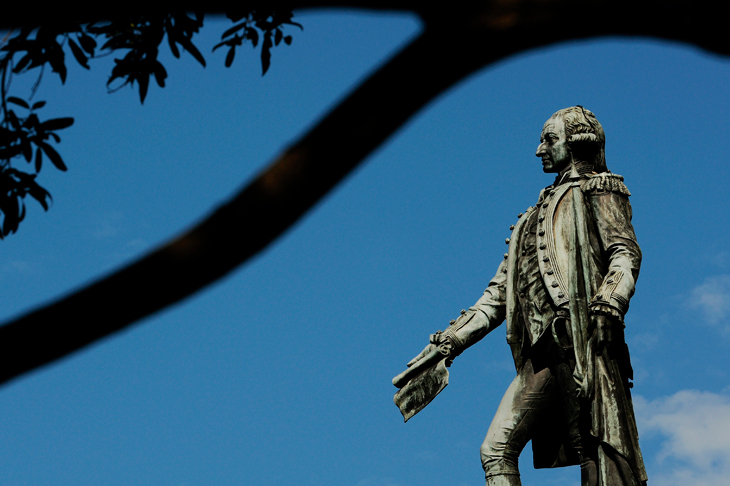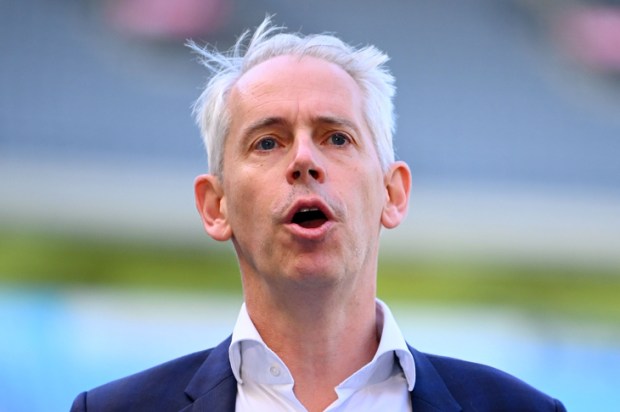Amanda Vanstone recently chose to reveal that neither she, nor indeed, anyone she knew, would be celebrating the arrival of the First Fleet.
Invited to give the Australia Day speech in Melbourne, I could not help but suggest that, dressed in black with a mantilla, Ms Vanstone proceed to one of Melbourne‘s great cathedrals. There, kneeling before the high altar, she should first ask for forgiveness from Melburnians for the exercise of her powers as minister in charge of immigration. Then, she should offer a prayer of humble thanks to Almighty God for the safe arrival of that First Fleet.
As I argued in the address, the reason for this is that Phillip came not only with ships, people and provisions. I have long advanced the theory that Philip came with four of the fundamental institutions which, with two others, have made us such an exceptional nation.
As one of the world’s seven oldest continuing and richest democracies, a nation which has made a disproportionate contribution to the defence and freedom of others, the question remains, why have we been so successful? Was it the population or was it our resources? The latest research indicates that it is a nation’s institutions which determine its success, or indeed, its failure.
This is demonstrated by the fact that at federation, Australia and Argentina were the world’s richest countries. A former Argentinian minister once told the ABC’s Four Corners that the reason was that Australia had British institutions. ‘If Argentina had such strong institutions,’ he added, ‘she would be like Australia in ten or twenty years.’
The first institution Phillip brought was English, which as the language of the world today is of such enormous advantage to those who are its native speakers.
The second was the rule of law. This means two things. First, everyone, including and especially the executive arm of government, is subject to the law, once a proposition almost unique in the world. The second aspect is that while citizens may do anything not prohibited by the law, the executive government may only do those things authorised by the law.
To describe the colony as a British gulag, as Malcolm Turnbull has, is completely erroneous.
Phillip came with a Charter of Justice, which, unlike the Soviet Constitution, was applied. The very first civil case in Australia was brought by two convicts against one of the ship’s captains. How they met and what brought them together is a wonderfully romantic story, one which is a great tribute to Lord Sydney, the minister responsible for establishing the colony. After hearing the case, the Judge Advocate found for the convicts and made a substantial award in their favour. This is, Mr Turnbull, something which never happens in a gulag.
There is another aspect of the rule of law which is important. Before leaving England Phillip wrote that ‘from the moment His Majesty’s forces take possession of the country… there can be no slavery in a free land and consequently no slaves.’
Keith Windschuttle observes that this once unique proposition was part of the original definition of what it meant to be an Australian. Today, this glorious fact is suppressed, unknown to our children.
The third institution Phillip brought was constitutional government, limited government under the Crown. Although Phillip had considerable powers, the penal colony was only an interim measure, eventually proving to be the world’s most successful experiment in criminal rehabilitation. And once free, people were free to do whatever was not prohibited by the law, while the governments, and in Australia, the parliaments were only authorised to do what the constitutions allowed.
The fourth institution which Phillip brought to Australia was our culture, all within the broader family of Western culture. This consists of all of those institutions separate from government – above all the family and the church – together with those values which are essential in a civilised society and without which neither constitutional government nor democracy can survive. Here we find civic virtue, that is where an essentially virtuous people operate without the direction and control of government, but according to defined values.
The values which Phillip brought can best be described as Judeo-Christian, and in particular, that advanced version which produced the great campaign unique to the British Empire against slavery. These values include truth, courage and love, and that unique Christian concept, loving your neighbour as yourself. This does not mean that those from other religions or no religion were unwelcome, only that the values be accepted against, say, polygamy or female genital mutilation.
In the great waves of immigration to this land, and especially in the post-war period, immigrants came to be contributors, to become loyal sons and daughters of Australia. They were received and generally treated well. There was no welfare immigration nor chain immigration.
But then the academicians of the Left introduced an alien concept disguised under an innocuous weasel word. As Humpty Dumpty famously said to Alice: ‘When I use a word, it means just what I choose it to mean—neither more nor less.’
One overused weasel word is ‘multicultural’ another is ‘republic’. Nobody knows what the user means. If multicultural means being nice that is one thing. But if it means immigrants do not have to accept that there is only one dominant culture in terms of fundamental principles, institutions and values, that they must be loyal Australians and that they must contribute, then this is a recipe for chaos and disaster and eventually, as we see in Europe, the end of the nation as we know it.
To return to the First Fleet, let us remember that the English language, the rule of law, constitutional government and our culture were the institutions Phillip brought to Australia which were to become the first four pillars of our nation. There were to be two more. Self-government was inevitable. But when the British first proposed federation, local politicians said no. We eventually had to do this ourselves, with British support.
But it was the institutions Phillip brought which formed the basis of our nation, and which should be celebrated on Australia Day.
Got something to add? Join the discussion and comment below.
Get 10 issues for just $10
Subscribe to The Spectator Australia today for the next 10 magazine issues, plus full online access, for just $10.
You might disagree with half of it, but you’ll enjoy reading all of it. Try your first month for free, then just $2 a week for the remainder of your first year.














Comments
Don't miss out
Join the conversation with other Spectator Australia readers. Subscribe to leave a comment.
SUBSCRIBEAlready a subscriber? Log in